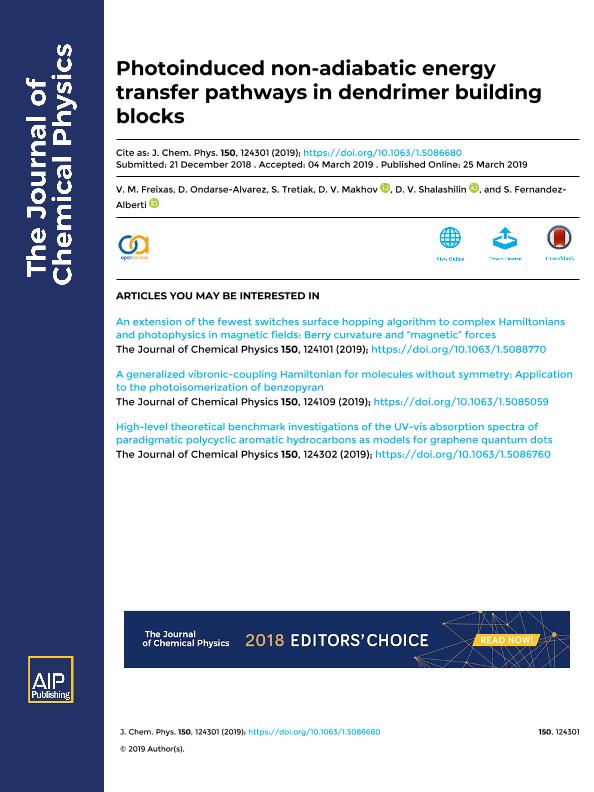Artículo
Photoinduced non-adiabatic energy transfer pathways in dendrimer building blocks
Freixas Lemus, Victor Manuel ; Ondarse Alvarez, Dianelys
; Ondarse Alvarez, Dianelys ; Tretiak, Sergei; Makhov, D.V.; D. V. Shalashilin; Fernández Alberti, Sebastián
; Tretiak, Sergei; Makhov, D.V.; D. V. Shalashilin; Fernández Alberti, Sebastián
 ; Ondarse Alvarez, Dianelys
; Ondarse Alvarez, Dianelys ; Tretiak, Sergei; Makhov, D.V.; D. V. Shalashilin; Fernández Alberti, Sebastián
; Tretiak, Sergei; Makhov, D.V.; D. V. Shalashilin; Fernández Alberti, Sebastián
Fecha de publicación:
03/2019
Editorial:
American Institute of Physics
Revista:
Journal of Chemical Physics
ISSN:
0021-9606
Idioma:
Inglés
Tipo de recurso:
Artículo publicado
Clasificación temática:
Resumen
The efficiency of the intramolecular energy transfer in light harvesting dendrimers is determined by their well-defined architecture with high degree of order. After photoexcitation, through-space and through-bond energy transfer mechanisms can take place, involving vectorial exciton migration among different chromophores within dendrimer highly branched structures. Their inherent intramolecular energy gradient depends on how the multiple chromophoric units have been assembled, subject to their inter-connects, spatial distances, and orientations. Herein, we compare the photoinduced nonadiabatic molecular dynamics simulations performed on a set of different combinations of a chain of linked dendrimer building blocks composed of two-, three-, and four-ring linear polyphenylene chromophoric units. The calculations are performed with the recently developed ab initio multiple cloning-time dependent diabatic basis implementation of the Multiconfigurational Ehrenfest (MCE) approach. Despite differences in short time relaxation pathways and different initial exciton localization, at longer time scales, electronic relaxation rates and exciton final redistributions are very similar for all combinations. Unlike the systems composed of two building blocks, considered previously, for the larger 3 block systems here we observe that bifurcation of the wave function accounted by cloning is important. In all the systems considered in this work, at the time scale of few hundreds of femtoseconds, cloning enhances the electronic energy relaxation by ∼13% compared to that of the MCE method without cloning. Thus, accurate description of quantum effects is essential for understanding of the energy exchange in dendrimers both at short and long time scales.
Palabras clave:
DYNAMICS
,
EHRENFEST
,
CLONING
,
POLYMERS
Archivos asociados
Licencia
Identificadores
Colecciones
Articulos(SEDE CENTRAL)
Articulos de SEDE CENTRAL
Articulos de SEDE CENTRAL
Citación
Freixas Lemus, Victor Manuel; Ondarse Alvarez, Dianelys; Tretiak, Sergei; Makhov, D.V.; D. V. Shalashilin; et al.; Photoinduced non-adiabatic energy transfer pathways in dendrimer building blocks; American Institute of Physics; Journal of Chemical Physics; 150; 12; 3-2019; 1-11
Compartir
Altmétricas



